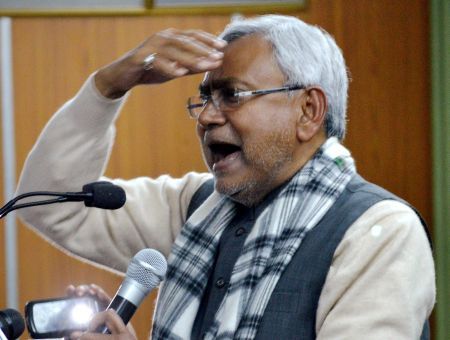
Janata Dal United’s Nitish Kumar and Sharad Yadav and Rashtriya Janata Dal United chief Lalu Prasad led 130 MLAs to Raj Bhawan to formally stake claim to form a government in Bihar.
With a rare political show of strength that brought legislators of the JD-U and its allies the RJD and Congress to the streets, Nitish demonstrated that he has a majority in the assembly.
The JDU has asked the Bihar Governor Keshri Nath Tripath to invite Nitish to be chief minister within 48 hours. It has expelled Chief Minister Jitan Ram Manjhi for anti-party activities. But a defiant Manjhi, who met Prime Minister Narendra Modi on Sunday, refused to step down and said that he will prove majority in the state assembly.
"We have paraded with MLAs in our support. We hope to get justice from Bihar Governor Keshri Nath Tripathi," JD-U spokesperson Neeraj Kumar said.
"We have told the governor that all the MLAs are present with their identity cards.... We are ready to prove our majority within the deadline the governor decides," Nitish said.
The numbers are with Nitish and he enjoys the support of majority of JD-U MLAs and its allies the RJD and Congress, according to the party spokesperson.
The JD-U has 115 MLAs in the 243-member assembly, most of who are reportedly with Nitish. It is backed by 24 MLAs of the RJD, five of the Congress, one from the Communist Party of India and two independents. A party needs 122 MLAs for a majority. According to JD-U sources, only 12 party legislators are with Manjhi. The BJP has 88 MLAs and it supported by three independents.
The leaders arrived at Raj Bhawan 15 minutes after Manjhi left the governor's house where he attending the swearing-in of Chief Information Commissioner Ashok Kumar Sinha. After his arrival from Delhi, the CM went straight from Patna airport to attend the function.
On Saturday, the JDU sacked Manjhi as its leader in the Bihar assembly and elected Nitish,
Interestingly, Manjhi was chosen by Nitish to be his successor last May when he stepped down owning responsibility for his party's poor performance in the national elections.










